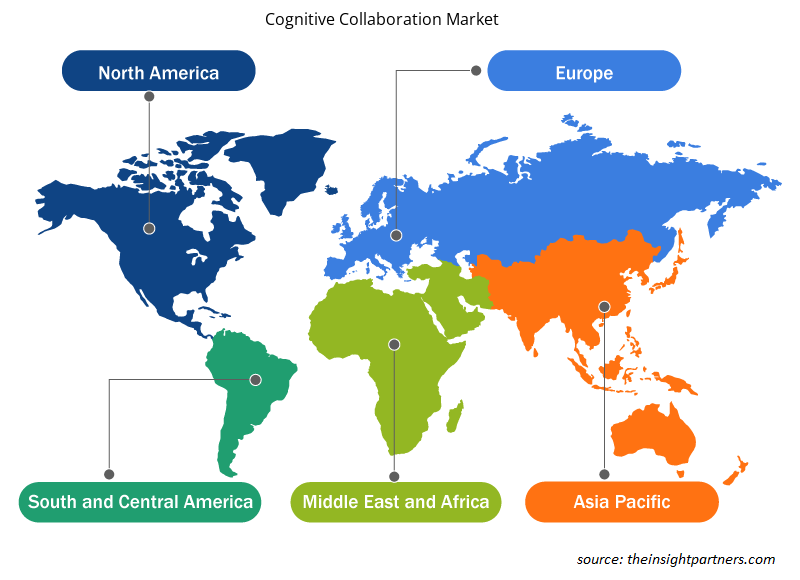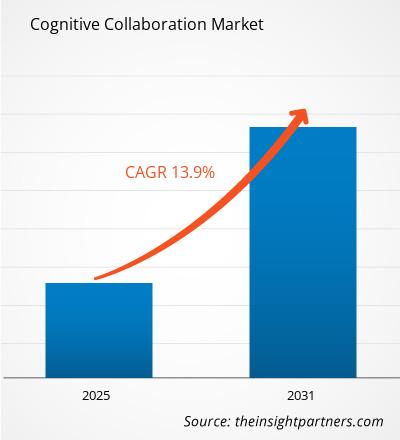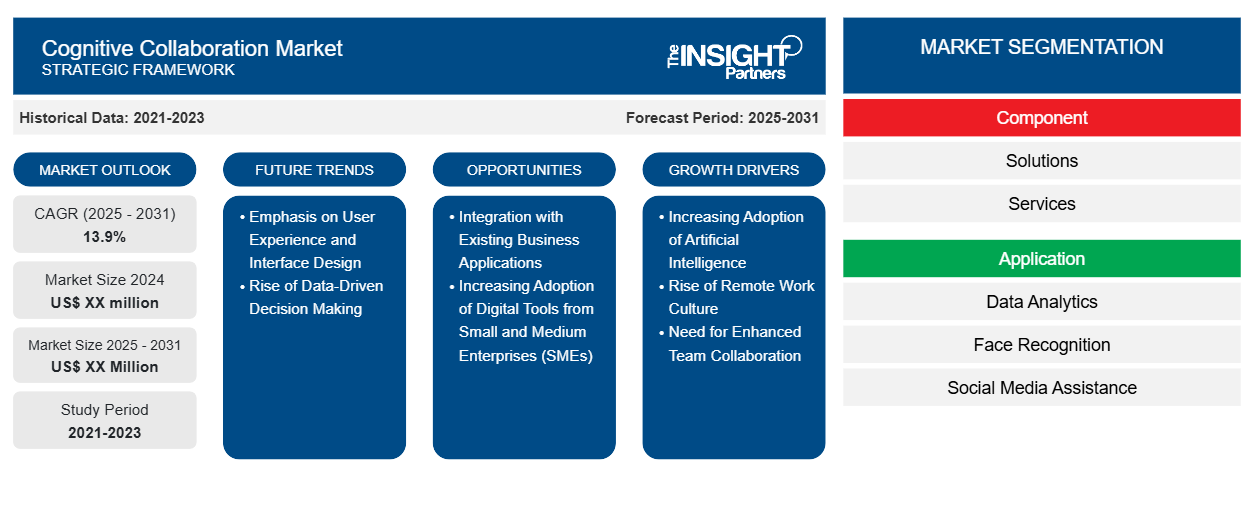من المتوقع أن يسجل سوق التعاون المعرفي معدل نمو سنوي مركب بنسبة 13.9٪ من عام 2023 إلى عام 2031، مع توسع حجم السوق من XX مليون دولار أمريكي في عام 2023 إلى XX مليون دولار أمريكي بحلول عام 2031.
تم تقسيم التقرير حسب المكون (الحلول والخدمات)؛ التطبيق (تحليلات البيانات، التعرف على الوجه، مساعدة وسائل التواصل الاجتماعي)؛ العمودي (تكنولوجيا المعلومات والاتصالات، الخدمات المصرفية والمالية والتأمين ، الطاقة والكهرباء، التعليم، التجزئة، وغيرها). تم تقسيم التحليل العالمي بشكل أكبر على المستوى الإقليمي والدول الرئيسية. يقدم التقرير القيمة بالدولار الأمريكي للتحليل والقطاعات المذكورة أعلاه
غرض التقرير
يهدف تقرير سوق التعاون المعرفي الصادر عن The Insight Partners إلى وصف المشهد الحالي والنمو المستقبلي وأهم العوامل الدافعة والتحديات والفرص. وسيوفر هذا رؤى لمختلف أصحاب المصلحة في الأعمال التجارية، مثل:
- مزودي/مصنعي التكنولوجيا: لفهم ديناميكيات السوق المتطورة ومعرفة فرص النمو المحتملة، وتمكينهم من اتخاذ قرارات استراتيجية مستنيرة.
- المستثمرون: إجراء تحليل شامل للاتجاهات فيما يتعلق بمعدل نمو السوق، وتوقعات السوق المالية، والفرص المتاحة عبر سلسلة القيمة.
- الهيئات التنظيمية: لتنظيم السياسات ومراقبة الأنشطة في السوق بهدف تقليل الانتهاكات والحفاظ على ثقة المستثمرين ودعم سلامة السوق واستقرارها.
تجزئة سوق التعاون المعرفي
عنصر
- الحلول
- خدمات
طلب
- تحليلات البيانات
- التعرف على الوجه
- المساعدة في وسائل التواصل الاجتماعي
رَأسِيّ
- تكنولوجيا المعلومات والاتصالات
- الخدمات المالية والمصرفية والتأمين
- الطاقة والقوة
- تعليم
- بيع بالتجزئة
- آحرون
الجغرافيا
- أمريكا الشمالية
- أوروبا
- آسيا والمحيط الهادئ
- أمريكا الجنوبية والوسطى
- الشرق الأوسط وأفريقيا
الجغرافيا
- أمريكا الشمالية
- أوروبا
- آسيا والمحيط الهادئ
- أمريكا الجنوبية والوسطى
- الشرق الأوسط وأفريقيا
قم بتخصيص هذا التقرير ليناسب متطلباتك
ستحصل على تخصيص لأي تقرير - مجانًا - بما في ذلك أجزاء من هذا التقرير، أو تحليل على مستوى الدولة، وحزمة بيانات Excel، بالإضافة إلى الاستفادة من العروض والخصومات الرائعة للشركات الناشئة والجامعات
- احصل على أهم اتجاهات السوق الرئيسية لهذا التقرير.ستتضمن هذه العينة المجانية تحليلاً للبيانات، بدءًا من اتجاهات السوق وحتى التقديرات والتوقعات.
عوامل نمو سوق التعاون المعرفي
- زيادة تبني الذكاء الاصطناعي: يعد دمج الذكاء الاصطناعي في أدوات التعاون محركًا مهمًا لسوق التعاون المعرفي. تعمل تقنيات الذكاء الاصطناعي على تعزيز الاتصال وتبسيط سير العمل وتحسين عملية اتخاذ القرار من خلال تحليل البيانات وتوفير رؤى قابلة للتنفيذ. مع سعي المؤسسات إلى الاستفادة من الذكاء الاصطناعي لتحسين الإنتاجية والكفاءة، تكتسب أدوات التعاون المعرفي التي تتضمن قدرات الذكاء الاصطناعي زخمًا. يعمل هذا الاتجاه على تحويل أساليب التعاون التقليدية، مما يتيح للفرق العمل بشكل أذكى وأكثر فعالية.
- صعود ثقافة العمل عن بعد: إن التحول نحو العمل عن بعد، والذي تسارع بسبب جائحة كوفيد-19، هو المحرك الرئيسي لسوق التعاون المعرفي. تتبنى المنظمات بشكل متزايد أدوات التعاون الرقمي لتسهيل التواصل والعمل الجماعي بين الفرق المتفرقة. توفر حلول التعاون المعرفي ميزات مثل تحرير المستندات في الوقت الفعلي، وعقد مؤتمرات الفيديو، وإدارة المهام، وهي ضرورية لنجاح العمل عن بعد. ومع تحول العمل عن بعد إلى جانب دائم للعديد من المنظمات، سيستمر الطلب على أدوات التعاون المعرفي في النمو.
- الحاجة إلى تعزيز التعاون بين الفرق: إن الحاجة المتزايدة إلى التعاون الفعال بين الفرق في بيئة الأعمال السريعة الخطى اليوم تعمل على تغذية سوق التعاون المعرفي. وتدرك المؤسسات أن تعزيز التعاون بين أعضاء الفريق يؤدي إلى زيادة الإبداع والإنتاجية والرضا الوظيفي. وتساعد أدوات التعاون المعرفي التي توفر ميزات مثل تعيين المهام الآلية ومشاركة المعرفة وتتبع المشاريع الفرق على العمل معًا بكفاءة أكبر. ويدفع هذا الطلب على قدرات التعاون المعززة إلى تبني الحلول المعرفية عبر مختلف الصناعات.
الاتجاهات المستقبلية لسوق التعاون المعرفي
- التركيز على تجربة المستخدم وتصميم الواجهة: إن أحد الاتجاهات المهمة في سوق التعاون المعرفي هو التركيز على تجربة المستخدم (UX) وتصميم الواجهة البديهية. ومع تبني المؤسسات لأدوات التعاون، فإنها تعطي الأولوية للحلول التي يسهل استخدامها وتسهل التفاعلات السلسة بين أعضاء الفريق. ويركز المزودون على إنشاء واجهات سهلة الاستخدام تعمل على تبسيط سير العمل وتعزيز المشاركة. ويسلط هذا الاتجاه الضوء على أهمية تجربة المستخدم في دفع التبني والرضا داخل حلول التعاون المعرفي.
- صعود عملية اتخاذ القرار المستندة إلى البيانات: يشهد سوق التعاون المعرفي اتجاهًا نحو اتخاذ القرار المستند إلى البيانات والذي يسهله التحليلات المتقدمة والتعلم الآلي. تستفيد المؤسسات من أدوات التعاون المعرفي لجمع الأفكار من بيانات التعاون، مما يمكنها من اتخاذ قرارات مستنيرة وتحسين أداء الفريق. هذا التركيز على تحليلات البيانات يمكّن الفرق من فهم أنماط التعاون وتحديد الاختناقات وتحسين سير العمل. ومع تزايد أهمية الأساليب المستندة إلى البيانات، ستكتسب أدوات التعاون المعرفي التي توفر قدرات تحليلية قوية ميزة تنافسية في السوق.
فرص سوق التعاون المعرفي
- التكامل مع تطبيقات الأعمال الحالية: هناك فرصة كبيرة للنمو في سوق التعاون المعرفي من خلال دمج أدوات التعاون مع تطبيقات الأعمال الحالية. من خلال إنشاء حلول تتكامل بسلاسة مع البرامج الشائعة مثل إدارة علاقات العملاء وتخطيط موارد المؤسسات وأدوات إدارة المشاريع، يمكن للمزودين تحسين تجربة المستخدم وتحسين كفاءة سير العمل. يتيح هذا التكامل للمؤسسات الاستفادة من ميزات التعاون المعرفي دون تعطيل عملياتها الراسخة، مما يجعلها خيارًا جذابًا للشركات التي تتطلع إلى تحسين عملياتها.
- زيادة اعتماد الأدوات الرقمية من قبل الشركات الصغيرة والمتوسطة الحجم: يقدم سوق التعاون المعرفي فرصًا لاستهداف الشركات الصغيرة والمتوسطة الحجم التي تتبنى بشكل متزايد الأدوات الرقمية لتحسين عملياتها. تسعى العديد من الشركات الصغيرة والمتوسطة الحجم إلى حلول تعاون ميسورة التكلفة وقابلة للتطوير لتحسين الاتصال والإنتاجية. من خلال تطوير أدوات تعاون معرفية مخصصة تلبي الاحتياجات الفريدة للشركات الصغيرة والمتوسطة الحجم، يمكن للمزودين الاستفادة من هذا القطاع غير المخدم في السوق، مما يؤدي إلى دفع النمو وتوسيع نطاق وصولهم.
رؤى إقليمية حول سوق التعاون المعرفي
لقد قام المحللون في Insight Partners بشرح الاتجاهات والعوامل الإقليمية المؤثرة على سوق التعاون المعرفي طوال فترة التوقعات بشكل شامل. يناقش هذا القسم أيضًا قطاعات سوق التعاون المعرفي والجغرافيا في جميع أنحاء أمريكا الشمالية وأوروبا ومنطقة آسيا والمحيط الهادئ والشرق الأوسط وأفريقيا وأمريكا الجنوبية والوسطى.

- احصل على البيانات الإقليمية المحددة لسوق التعاون المعرفي
نطاق تقرير سوق التعاون المعرفي
| سمة التقرير | تفاصيل |
|---|---|
| حجم السوق في عام 2023 | XX مليون دولار أمريكي |
| حجم السوق بحلول عام 2031 | XX مليون دولار أمريكي |
| معدل النمو السنوي المركب العالمي (2023 - 2031) | 13.9% |
| البيانات التاريخية | 2021-2022 |
| فترة التنبؤ | 2024-2031 |
| القطاعات المغطاة | حسب المكون
|
| المناطق والدول المغطاة | أمريكا الشمالية
|
| قادة السوق وملفات تعريف الشركات الرئيسية |
|
كثافة اللاعبين في سوق التعاون المعرفي: فهم تأثيرها على ديناميكيات الأعمال
يشهد سوق التعاون المعرفي نموًا سريعًا، مدفوعًا بالطلب المتزايد من المستخدم النهائي بسبب عوامل مثل تفضيلات المستهلك المتطورة والتقدم التكنولوجي والوعي المتزايد بفوائد المنتج. ومع ارتفاع الطلب، تعمل الشركات على توسيع عروضها والابتكار لتلبية احتياجات المستهلكين والاستفادة من الاتجاهات الناشئة، مما يؤدي إلى زيادة نمو السوق.
تشير كثافة اللاعبين في السوق إلى توزيع الشركات أو المؤسسات العاملة في سوق أو صناعة معينة. وهي تشير إلى عدد المنافسين (اللاعبين في السوق) الموجودين في مساحة سوق معينة نسبة إلى حجمها أو قيمتها السوقية الإجمالية.
الشركات الرئيسية العاملة في سوق التعاون المعرفي هي:
- بلو سكيب (شركة ثوت ستريم المحدودة)
- شركة سيسكو سيستمز
- المقياس المعرفي
- التعاون.Ai، المحدودة
- أنظمة إنتك
إخلاء المسؤولية : الشركات المذكورة أعلاه ليست مرتبة بأي ترتيب معين.

- احصل على نظرة عامة على أهم اللاعبين الرئيسيين في سوق التعاون المعرفي
نقاط البيع الرئيسية
- التغطية الشاملة: يغطي التقرير بشكل شامل تحليل المنتجات والخدمات والأنواع والمستخدمين النهائيين لسوق التعاون المعرفي، مما يوفر صورة شاملة.
- تحليل الخبراء: تم تجميع التقرير على أساس الفهم العميق لخبراء الصناعة والمحللين.
- معلومات محدثة: يضمن التقرير أهمية الأعمال التجارية بسبب تغطيته للمعلومات الحديثة واتجاهات البيانات.
- خيارات التخصيص: يمكن تخصيص هذا التقرير لتلبية متطلبات العملاء المحددة وبما يتناسب مع استراتيجيات العمل بشكل مناسب.
وبالتالي، يمكن أن يساعد تقرير البحث حول سوق التعاون المعرفي في تمهيد الطريق لفك شفرة وفهم سيناريو الصناعة وآفاق النمو. ورغم وجود بعض المخاوف المشروعة، فإن الفوائد الإجمالية لهذا التقرير تميل إلى التفوق على العيوب.
- التحليل التاريخي (سنتان)، سنة الأساس، التوقعات (7 سنوات) مع معدل النمو السنوي المركب
- تحليل PEST و SWOT
- حجم السوق والقيمة / الحجم - عالمي، إقليمي، بلد
- الصناعة والمنافسة
- مجموعة بيانات إكسل
التقارير الحديثة
شهادات العملاء
سبب الشراء
- اتخاذ قرارات مدروسة
- فهم ديناميكيات السوق
- تحليل المنافسة
- رؤى العملاء
- توقعات السوق
- تخفيف المخاطر
- التخطيط الاستراتيجي
- مبررات الاستثمار
- تحديد الأسواق الناشئة
- تحسين استراتيجيات التسويق
- تعزيز الكفاءة التشغيلية
- مواكبة التوجهات التنظيمية





















 احصل على عينة مجانية ل - سوق التعاون المعرفي
احصل على عينة مجانية ل - سوق التعاون المعرفي